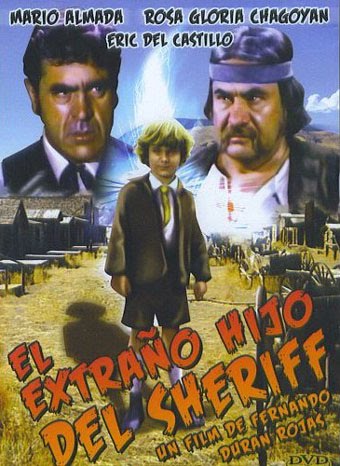


The day of his execution, Erick (the believed dead twin) makes a demonic appearance that scares the hell out of people and by himself kills his father (he was hung up).
#EL HIJO DEL SHERIFF TRIAL#
Local town's people hear about the murder of the other twin and decide to make a trial against the father who gets the death penalty condemn. until his brother comes from the dead and seeks revenge against his father, the doctor, and anyone else who comes into the way. The other one stays alive and lives a normal life. A hell of an effective doctor! In consequence, one of the twins tragically dies. He hires the town's doctor and through a graphic but not grotesque scene, they get separated only by a scalpel. Years after, he decides that it's time to get his sons separated. So the sheriff decides to tie with chains his twins in the house attic.
#EL HIJO DEL SHERIFF MOVIE#
The movie deals with the town's sheriff's twins that were born with an abnormal physical feature : they were born glued. "El Extraño." has a very interesting plot that deals with medicine, science, religion, and of course, evil. His book of poetry and image, Ford Over, is forthcoming in 2016.Filmed in Durango and supported big time by the government of the state, "El Extraño Hijo del Sheriff" is the Mexican "Basket Case" version but with a few differences that I will explain later. His most recent chapbooks are Killing Current (Mouthfeel Press, 2012) and Ioyaiene (Handmade for Fresh Arts Houston-based Community Supported Art Program, 2014). and Mexico, including The Volta, Mandorla, Aufgabe, eleven eleven, Third Text, Animal Shelter, HTMLGiant and Fence. He has translated numerous books from the Spanish, including Tijuana Dreaming: Life and Art at the Global Border (Duke University Press, 2012) and Feminism: Transmissiones and Retransmissions (Palgrave Macmillan, 2011). His texts have appeared in journals in the U.S. His work is informed by experimental poetics, radical aesthetics and cross-border cultural production. John Pluecker is a writer, interpreter, translator and co-founder of the language justice and literary experimentation collaborative Antena. candidate at the University of California, Los Angeles. Coeditor of two anthologies of Mexican poetry, his work has appeared in Zur Dos: Última poesía latinoamericana (2004) and Malditos Latinos, Malditos Sudacas: Poesía Iberoamericana Made in USA (2009) among other compilations. He is a Ph.D. Román Luján, a Mexican poet and literary translator based in Los Angeles, is the author of Instrucciones para hacerse el valiente (2000), Aspa Viento (2003, artist book in collaboration with painter Jordi Boldó), Deshuesadero (2006) and Drâstel (2010). In the end, the titles were re-ordered alphabetically to match the gesture of Román’s original.

As if Spanish could be separated out from a global, neoliberal economy that has sent millions of people north and sent thousands of guns south and wait, I said I would not tell you what the poem is doing. As if Spanish were one language (just one) and English another language (just one). As if English were not actively chewing away at the inside of Spanish or gnawing on the corners or stealing off bits piece by piece. Did this poem ever actually exist in “Spanish”? As if Spanish were separate from English. The target is the source is the target is the source. The “source” language is already intermixed with the “target” language, to use the terms of professionalized translation. Sometimes it is hard to tell if a particular title is in fact in Spanish or in English (357 Magnum, Zapata, Mestizo). I decided to put “bilingualism” in quotes because I wonder about something. This to reflect the “bilingualism” at play in the original poem as well. Some Spanish titles were left in Spanish and some English titles were left in English.

Some Spanish titles became English titles and vice versa. Each title was wrestled and re-thought and a decision was made about what to do with it. But I can say a bit about the process of translating it. In my opinion, the task of the translator (thx, Walter Benjamin) is not to tell you what the poem is doing or analyze it (though it could be suggested that thinking about this poem outside of the context of US-fueled violence and warfare might perhaps imply a kind of travesty of justice). According to the Guinness Book of World Records, Almada has the distinction of being the living actor who has appeared in the most movies. Román Luján composed this poem out of the titles of Mexican B movies featuring actor Mario Almada. El fiscal de hierro 2: la venganza de Ramona.


 0 kommentar(er)
0 kommentar(er)
